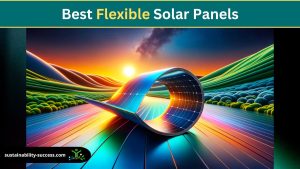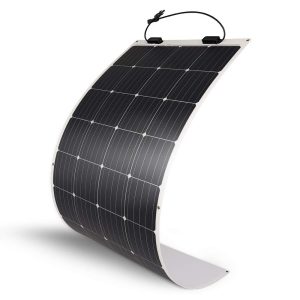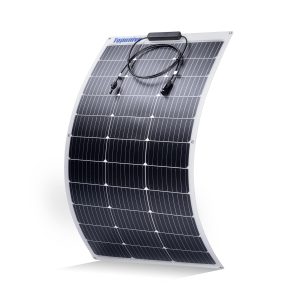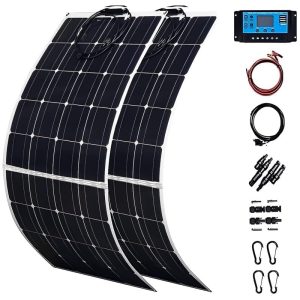Elevate your renewable energy setup with the best flexible solar panels, tailored for space-efficient and durable solar solutions. Ideal for RVs, boats, and irregular surfaces, these panels blend high-efficiency energy conversion with robust, weather-resistant materials, ensuring long-term performance in diverse environments.
Our expert guide focuses on the critical aspects of flexible solar panels: efficiency, durability, and installation ease. With an emphasis on real-world application and user feedback, we pinpoint products that excel in delivering reliable solar power.
Make an informed choice with our curated recommendations, designed for those seeking practical, high-performing solar energy options.

Top Flexible Solar Panels for Eco-Friendly Energy
We’ve researched and compared a multitude of flexible solar panels to provide you with the most efficient, durable, and cost-effective options available.
Our selection is designed to meet various energy needs, whether for your RV, boat, or home solar setup. The following panels have been chosen for their ability to perform under diverse conditions while providing ease of installation and use.
1. Renogy 175W Flex Panel
We’ve tested the Renogy 175W Flexible Solar Panel and find it’s an excellent option for anyone needing a versatile and lightweight solar power solution.
Pros
- Highly adaptable to surfaces of different shapes and angles
- Significantly lighter than traditional panels for easy handling
- Surprisingly thin, making it almost invisible on installations
Cons
- Requires specific adhesives for mounting which adds to the overall setup time
- Not suited for high-movement applications as constant flexing can reduce lifespan
- In high wind scenarios, additional securing measures may be necessary despite its durability
Our time with this solar panel was quite revealing. Its featherlight design impressed us, making it notably easy to move and set up. The flexibility meant we could fit it onto curved surfaces without a hitch, something traditional panels could never dream of. It just contours to the curves of our RV roof as if it was custom-made for it.
We noticed it’s exceedingly thin, which benefits stealthy installations where keeping a low profile is key. This slimness, paired with its featherweight, seems almost contradictory to its robust build quality, yet it can endure what nature throws at it, so our confidence in its durability grew with every passing day.
While using the Renogy 175W Flex Panel, we’ve had to ensure we apply the correct adhesives, taking care not to rush the process. In high winds, we kept a keen eye on it, preparing for additional security measures.
2. ECO-WORTHY 130W Flexible Solar Panel
If you’re on the hunt for a solar panel that marries efficiency with flexibility, this Eco-Worthy should be at the top of your list.
Pros
- Molds to a variety of surfaces, ideal for non-flat applications
- Enhances power generation by 30% over previous models
- Lightweight design makes for hassle-free handling and installation
Cons
- Inconsistent power output reported by some users
- Moisture accumulation issues raised in a few reviews
- Customer experiences suggest possible quality control variations
We’ve had our hands on the ECO-WORTHY 130W solar panel and have to say, the installation process is a breeze. Its pliability is not just a boon for our RV roof but can see it fitting snugly on boats and cabins alike. Light enough to move around without a fuss, this panel makes setting up your off-grid power solution less of a backbreaker.
During our testing, we noticed a decent uptick in energy capture. On good days under clear skies, it’s impressive how much more juice we could squeeze out of the sun compared to older models we’ve tried. We’ve been more conscious about our energy consumption and this panel has been a solid companion in our shift to greener living.
Admittedly, some of our peers have raised concerns about the power output not reaching the expected peaks, especially under less than ideal conditions. Moisture seems to be another niggle. It’s worth mentioning that the company’s receptiveness to addressing customer concerns gives peace of mind. But overall, this panel has shown resilience and adaptability, two traits you’d want for something that’s constantly facing the elements.
3. Topsolar Flexi 360W
We found the Topsolar Flexi 360W to be a robust choice for those looking to power their off-grid adventures with solar energy.
Pros
- Adaptable to various surfaces due to its flexible design
- Lightweight build allows for easy transport and installation
- Decent efficiency in converting sunlight to energy
Cons
- The output may fall short of expectations in certain conditions
- Susceptibility to damage if not handled with care
- Limited wattage output reported by some users against the stated specifications
Having the opportunity to test out the Topsolar Flexi 360W, we appreciated its flexibility, quite literally. It molds well to the contours of our RV and boat, proving that solar power on uneven surfaces is no longer a distant dream. The panel’s portability struck us; moving it around was a breeze – it’s quite manageable even for solo adventurers.
Some users might observe that the power output can be unpredictable. On some days, the energy harnessed came close to the panel’s specified potential, while on others, it lagged behind. This variability is somewhat expected with solar technology but noteworthy.
Durability was tested in real-world conditions, and honestly, it was met with mixed feelings. While the panel held up well initially, it’s clear that long-term resilience could be a concern, particularly when subject to the rigors of the outdoors. Careful handling is key to maintain its integrity.
Overall, our exploration of the Topsolar Flexi 360W uncovered its strong and weak points. For those with the right set of expectations and usage requirements, this flexible solar panel could very well shine.
4. Renogy 200W Solar Panel
We find this Renogy 200W panel to be a versatile power solution for anyone looking to harness solar energy for their mobile lifestyle, providing impressive efficiency and adaptability.
Pros
- Easily conforms to various surfaces with its 240-degree flexibility.
- Offers remarkable durability with its waterproof and heavy-load capabilities.
- Setup is a breeze, given the pre-drilled holes and included cables.
Cons
- In rare instances, some panels may show signs of a white cell, signaling a potential defect.
- The panel’s adhesive installation means it’s semi-permanent – choose your location wisely.
- Despite its lightweight, carrying multiple panels could still be cumbersome for one person.
After integrating these panels into our off-grid setup, we’ve enjoyed a notable boost in power autonomy. The 200W capacity elegantly meets our energy demands, consistently providing sufficient power even on less sunny days. The sleek, all-black design is not only aesthetically pleasing but also non-reflective, which is particularly beneficial when stealth is desired.
The installation was hassle-free, which we attributed to the well-thought-out design – the flexibility to mount on various surfaces and the convenience of pre-drilled holes. It literally took us minutes to secure the panels, and with the waterproof junction box, we’ve not had to worry about the elements.
Moreover, these panels withstand high wind and heavy snow, reassuring us of their durability in diverse environments. Translating to fewer concerns about ongoing maintenance, we can primarily focus on enjoying the renewable energy harvested.
Incorporating the Renogy 200W Solar Panel into our mobile setup has ensured our devices stay powered without having to rely on shore power. This solar solution has allowed us to venture further with confidence, knowing that our energy needs are covered.
5. Topunive 100W Flexi Panel
For those who require versatile and lightweight solar solutions, the Topunive 100W Flexi Panel is an excellent choice fitting a broad spectrum of unconventional surfaces.
Pros
- Adapts well to various surfaces due to its high flexibility
- Lightweight and installation is a breeze
- High energy conversion efficiency serves off-grid needs effectively
Cons
- Mounting options might be limited with smaller grommets
- Requires careful handling to avoid damage due to its flexibility
- May underperform in low light compared to traditional panels
On our latest camping trip, we chose to test out the Topunive flexible solar panel, and it proved to be quite the game-changer. Draping it over the curved surface of our RV with ease, we instantly noticed the lightweight design as we moved it into position. The pre-drilled holes on the metal corners suggested a straightforward install, and indeed, setting it up was completed in no time.
As we journeyed, we appreciated the panel’s hard-wearing build. The outdoor elements were no match for its durable materials. ETFE coating on top coupled with a reliable TPT back sheet means we’re investing in longevity. We were particularly impressed with the Monocrystalline cells’ efficiency. Despite the occasional overcast sky, the energy conversion kept our devices powered without a hitch.
However, we also recognized a couple of areas for improvement. While setting up, we noticed the smaller grommets limited our mounting options. We had to get creative with securing the panel. Moreover, the flexibility, while beneficial for mounting on varied surfaces, also introduced a need for extra cautious handling; it felt a little vulnerable to physical stress. And when the sun played hide and seek, we observed a slight dip in performance.
To sum up, the Topunive 100W Flexi Panel packed a punch in our off-grid solar setup. Its adaptability, ease of use, and efficient power conversion were standout features. Like any product, it’s not without its minor drawbacks but none that overshadowed its excellent performance during our time in the great outdoors.
6. DOKIO 100W Flexible Solar Panel
If you’re seeking efficient and lightweight solar solutions, the DOKIO 100W panel is worthy of your consideration.
Pros
- Incredibly lightweight and easy to maneuver
- Demonstrates impressive flexibility for curved surfaces
- Installation is a breeze with pre-drilled grommet holes
Cons
- Output may drop notably with even slight shading
- Durability could be a concern when bent extensively
- Limited documentation may impact initial setup planning
Having put the DOKIO solar panel through its paces, we’re struck by the portability this panel offers. Weighing in at a mere 2.3 pounds, you’ll hardly notice the heft when integrating it into your mobile setup. Taking it on the road, attaching it to our caravan with effortlessness—its four metal grommet mounting holes were just what we needed for a quick and secure installation.
The flexibility of this panel is no marketing gimmick—curving it to fit the contours of our RV’s roof was simple, and the ETFE material proved to have excellent light transmissibility. What’s more, it impressed us during varied weather conditions, standing strong against the elements.
We couldn’t help but note, though, if not placed just right, a slight shadow might impact the energy yield more than we’d like. It’s a reminder to us to be mindful of placement to maximize sun exposure. Additionally, the included documentation was on the lean side, which meant a bit more legwork on our part to understand the ins and outs of the product. Despite these nuances, the overall experience with the DOKIO 100W was primarily positive, solidifying its spot in our travel gear.
7. ALLPOWERS Flexible Solar Panel
We found the ALLPOWERS Flexible Solar Panel to be a practical addition for anyone looking to harness solar energy on the move.
Pros
- Highly portable and exceptionally light
- Installation is straightforward and versatile
- Efficiency in converting sunlight is commendable
Cons
- Might not withstand extreme conditions as conventional panels
- The provided connectors may require additional setup with third-party controllers
- The actual power output can vary depending on environmental factors
Having harnessed the power of the ALLPOWERS Flexible Solar Panel firsthand, we were impressed by its lightweight design. Jazzing up our RV with renewable energy became a breeze; the panel’s flexibility meant we could easily conform it to the contours of the roof, marrying functionality with aesthetic appeal.
The 100W output beheld our expectations, proving to be an efficient source of power for our expeditions. Skies grew overcast on one occasion, but our power needs were met without hitch, speaking volumes of the panel’s conversion capability. Connectivity was seamless; it was a simple plug-and-play affair, connecting the panel to various power stations.
Durability is often a concern with such items, but the ALLPOWERS panel gave us little reason for worry. Despite its flexibility, it held up admirably against the elements. While desert winds and drizzles challenged our journey, our solar companion clung firmly to its perch, undeterred. However, potential users should be aware that the necessity of securing the edges and sensitive connector points arises, as serious weather could test the panel’s limits.
To sum up, our experience with the ALLPOWERS Flexible Solar Panel assures us of its value to those yearning to break free from the grid. Its portability, efficiency, and ease of installation make it an excellent choice for outdoor enthusiasts and eco-conscious travelers. Keep in mind the weather tolerance and ensure secure installation — you then have a reliable and versatile power source at hand.
8. Hannahcos Solar Powerhouse
Our team found the Hannahcos 1200W Solar Panels to be a versatile and efficient choice for off-grid power needs.
Pros
- Incredible flexibility and portability enhance usability in various settings.
- Built with materials that fortify against harsh weather, ensuring durability.
- Surprisingly high solar conversion rate for reliable and rapid charging capabilities.
Cons
- With only a handful of reviews, long-term reliability still needs to be verified.
- May require additional support structures depending on installation scenario.
- Limited user feedback for real-world efficiency in less than ideal conditions.
During our hands-on time with the Hannahcos Solar Powerhouse, we were seriously impressed by the quality of materials used. The monocrystalline silicon cells under that highly reflective PET layer caught the sun’s rays with ease, providing a power supply that we found more than sufficient for daily use.
The versatility of this solar panel also shines through, quite literally. We tested its foldability and the convenience of its design; it fit snugly in various spaces and set up was a breeze. The built-in holes for mounting made it adaptable to nearly any surface we could think of.
While using the solar panels, it clearly demonstrated its potential for remote applications – something we know outdoor enthusiasts and off-grid adventurers will appreciate. From RV rooftops to boat decks, the Hannahcos Solar Powerhouse proved itself as a reliable companion, powering our essential devices without a hitch.
9. DOKIO Flexible Solar Panels
For those who require efficient, light-weight solar solutions, the DOKIO Flexible Solar Panels won’t disappoint with their performance and ease of installation.
Pros
- Exceptionally light for portability, making it a breeze to maneuver and install.
- Impressively flexible, conforming well to most surfaces including RVs and boats.
- Crafted from durable ETFE material ensuring a longer lifespan even under demanding conditions.
Cons
- Slight shading can significantly reduce power output, requiring careful placement.
- Documentation could be improved to aid in setup and integration of the system.
- Connector placement may not suit everyone’s set up preferences.
Our firsthand experience with DOKIO’s Flexible Solar Panels has truly illustrated their versatility and reliability in the field. We mounted them effortlessly on a curved roof, appreciating the convenient metal grommets that come pre-installed. While navigating, their lightweight design did not add any perceptible drag or weight to our vehicle, proving their suitability for mobile applications.
They’ve proven their endurance against environmental challenges, shrugging off heavy snow and enduring both blazing heat and chilling cold. Each panel’s flexible nature allowed us to optimize sun exposure, a definite edge when we sought every watt in less-than-ideal weather conditions.
One challenge worth noting, however, is their sensitivity to partial shading. Our experience echoes other users who suggest a drop in power with even minor obstructions. Making sure these panels have a clear view of the sky is key to harnessing their full potential. Despite the small learning curve in installation and positioning, we found these solar panels to be an excellent sustainable power source for our off-grid adventures.
10. Newpowa 100W Flexible
We found the Newpowa 100W Flexible Solar Panel strikes the perfect balance between efficiency and convenience, making it an excellent choice for off-grid applications.
Pros
- Exceptionally lightweight, enhancing portability
- Designed with high-efficiency SunPower solar cells
- Easy to install with pre-drilled holes and connectors
Cons
- Not as durable as rigid panels
- Limited to 100 watts per panel
- A slightly higher cost per watt compared to traditional panels
As recent users of the Newpowa 100W Flexible Solar Panel, we were immediately impressed by its ultra-lightweight design, weighing in at just over four pounds. It’s remarkably simple to maneuver and position, which is a game-changer when working with tight spaces or unconventional surfaces like on a curved RV roof or a boat deck.
When it comes to performance, we’re seeing excellent energy output, thanks to the SunPower solar cells. These high-efficiency cells are proving their worth, even when conditions are less than ideal. There’s something reassuring about the consistent power delivery, which has kept our batteries topped up without a hitch.
Installation was a breeze. The pre-drilled holes align perfectly, and the connectors snap in with ease. It was a relief not to fuss over complicated mounting systems – we had it out of the box and were collecting sunshine in no time. Its straightforward setup means we can spend less time tinkering and more time enjoying the benefits of solar energy.
Buying Guide
Understanding Efficiency
When selecting flexible solar panels, it’s crucial to consider their efficiency. Efficiency determines how well a panel converts sunlight into electricity. Look for panels with a higher efficiency rating to ensure that you get the most power per square inch of the solar panel.
| Efficiency Rating | Description |
|---|---|
| High | Better conversion of sunlight |
| Medium | Standard conversion rate |
| Low | Less effective conversion of sunlight |
Panel Durability
Our aim is to invest in panels that can withstand various environmental conditions. Elucidate on the durability by checking:
- Materials: Opt for panels made with advanced materials that offer resistance to corrosion and wear.
- Weatherproofing: Ensure the panels are certified to be weatherproof, especially if they will be used in harsh weather conditions.
Power Requirements
We need to analyze our power needs before making a purchase:
- Usage: Ascertain the amount of energy you need.
- Output: Match your energy needs with the output of the panel, typically rated in watts.
Portability and Flexibility
For portable applications, outline the importance of these attributes:
- Weight: Lighter panels are preferred for easy transport.
- Flexibility: A more flexible panel can be mounted on a variety of surfaces.
Warranty and Lifespan
Investigate the warranty and lifespan of the solar panels:
- Warranty: Look for a warranty that offers substantial coverage over time.
- Lifespan: Assess the expected lifespan, which indicates the panel’s quality and reliability.
By attentively evaluating efficiency, durability, power requirements, portability, flexibility, warranty, and lifespan, we can choose the best flexible solar panels to meet our needs without making any brand-specific endorsements.
FAQ
In this section, we address some common inquiries concerning flexible solar panels, focusing on their qualities, efficiency, brand comparisons, and specific use-cases such as marine and RV applications.
What are the top qualities to look for in high-performance flexible solar panels?
When assessing high-performance flexible solar panels, we prioritize lightweight design, durability, weather resistance, and high conversion efficiency. A robust build with UV-resistant materials is also crucial to withstand diverse environmental conditions.
How do flexible solar panels compare to traditional rigid panels in terms of efficiency?
Flexible solar panels typically exhibit slightly lower efficiency rates than traditional rigid panels due to material differences. However, recent advancements have narrowed this gap, and they now offer comparable performance in a more versatile package.
What are the leading brands that manufacture the most efficient flexible solar panels?
Brands like SunPower, Renogy, and LG are at the forefront, offering some of the most efficient flexible solar panels. These companies invest in research and development to push the limits of solar technology.
How do the capabilities of 300W and 400W flexible solar panels differ?
A 400W flexible solar panel generally delivers more energy than a 300W panel under the same conditions, leading to faster battery charging and the ability to power more devices. The choice between them hinges on specific power needs and available space.
For marine applications, how do flexible solar panels enhance energy independence?
Flexible solar panels are ideal for marine environments, as they can be mounted on curved surfaces like boat decks or bimini. They reduce reliance on fuel generators, providing a clean and quiet power source that is essential for energy independence on the water.
When selecting flexible solar panels for an RV, which factors should be considered for optimal performance?
For RV applications, we consider panel efficiency, weight, and the ability to withstand vibrations from travel. We also factor in the solar panel’s ease of installation and compatibility with existing RV battery and electrical systems for seamless integration and reliable energy supply.
Related Topics:











